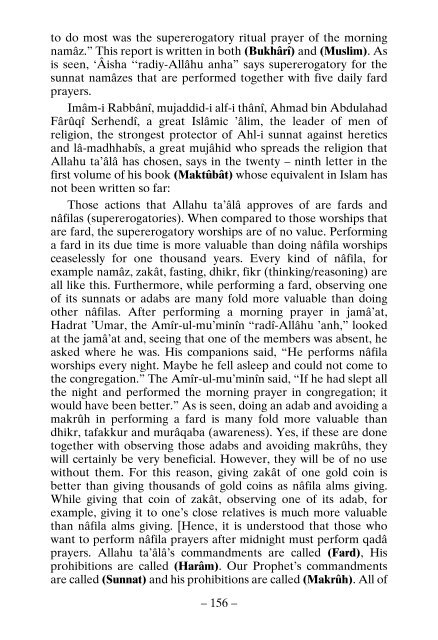Book of Namaz
You also want an ePaper? Increase the reach of your titles
YUMPU automatically turns print PDFs into web optimized ePapers that Google loves.
to do most was the supererogatory ritual prayer <strong>of</strong> the morning<br />
namâz.” This report is written in both (Bukhârî) and (Muslim). As<br />
is seen, ‘Âisha ‘‘radiy-Allâhu anha” says supererogatory for the<br />
sunnat namâzes that are performed together with five daily fard<br />
prayers.<br />
Imâm-i Rabbânî, mujaddid-i alf-i thânî, Ahmad bin Abdulahad<br />
Fârûqî Serhendî, a great Islâmic ’âlim, the leader <strong>of</strong> men <strong>of</strong><br />
religion, the strongest protector <strong>of</strong> Ahl-i sunnat against heretics<br />
and lâ-madhhabîs, a great mujâhid who spreads the religion that<br />
Allahu ta’âlâ has chosen, says in the twenty – ninth letter in the<br />
first volume <strong>of</strong> his book (Maktûbât) whose equivalent in Islam has<br />
not been written so far:<br />
Those actions that Allahu ta’âlâ approves <strong>of</strong> are fards and<br />
nâfilas (supererogatories). When compared to those worships that<br />
are fard, the supererogatory worships are <strong>of</strong> no value. Performing<br />
a fard in its due time is more valuable than doing nâfila worships<br />
ceaselessly for one thousand years. Every kind <strong>of</strong> nâfila, for<br />
example namâz, zakât, fasting, dhikr, fikr (thinking/reasoning) are<br />
all like this. Furthermore, while performing a fard, observing one<br />
<strong>of</strong> its sunnats or adabs are many fold more valuable than doing<br />
other nâfilas. After performing a morning prayer in jamâ’at,<br />
Hadrat ’Umar, the Amîr-ul-mu’minîn “radî-Allâhu ’anh,” looked<br />
at the jamâ’at and, seeing that one <strong>of</strong> the members was absent, he<br />
asked where he was. His companions said, “He performs nâfila<br />
worships every night. Maybe he fell asleep and could not come to<br />
the congregation.” The Amîr-ul-mu’minîn said, “If he had slept all<br />
the night and performed the morning prayer in congregation; it<br />
would have been better.” As is seen, doing an adab and avoiding a<br />
makrûh in performing a fard is many fold more valuable than<br />
dhikr, tafakkur and murâqaba (awareness). Yes, if these are done<br />
together with observing those adabs and avoiding makrûhs, they<br />
will certainly be very beneficial. However, they will be <strong>of</strong> no use<br />
without them. For this reason, giving zakât <strong>of</strong> one gold coin is<br />
better than giving thousands <strong>of</strong> gold coins as nâfila alms giving.<br />
While giving that coin <strong>of</strong> zakât, observing one <strong>of</strong> its adab, for<br />
example, giving it to one’s close relatives is much more valuable<br />
than nâfila alms giving. [Hence, it is understood that those who<br />
want to perform nâfila prayers after midnight must perform qadâ<br />
prayers. Allahu ta’âlâ’s commandments are called (Fard), His<br />
prohibitions are called (Harâm). Our Prophet’s commandments<br />
are called (Sunnat) and his prohibitions are called (Makrûh). All <strong>of</strong><br />
– 156 –

















